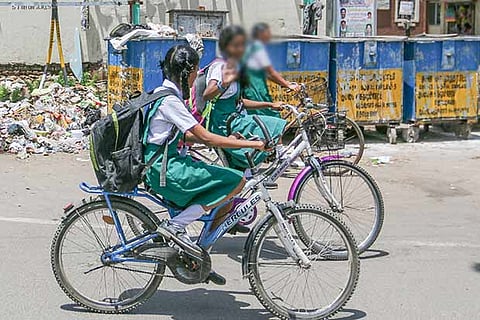

Chennai
The Protection of Children from Sexual Offences Act (POCSO) introduced in 2012 was dubbed as a panacea for safeguarding children from sexual abuse and exploitation. But contrary to expectations, the Act has not only failed to deliver owing to its shoddy implementation by the police and the judiciary, but has also thrown up several contradictions and conflicts when it comes to sexual relations in a child marriage and instances of minor girls involved in consensual sex.
The contradictions had come to the fore when a father moved a plea at the Madurai Bench of the Madras High Court seeking to abort his minor daughter’s pregnancy. He had alleged that the accused had raped his daughter and thus, she must be directed to terminate her pregnancy.
But the girl contended that the pregnancy was owing to consensual sex and she wanted to carry the child full term. A photograph was also produced, to show that the girl and the accused had married and a submission made that they had decided not to abort the foetus.
Justice Vimala, who dismissed the father’s plea after accounting for the aspect that while the couple were minors when the sexual intercourse occurred, but above 18 years when they were produced at the court, held that “Since the marriage itself wasn’t void, then the father had no right to direct his daughter to terminate her pregnancy without consent.”
But the case also brought into focus, based on the contention of the girl’s father, that under POCSO Act, the girl’s consent was immaterial till the age of 18. But as pointed out by Justice Vimala, there existed certain contradictions between certain provisions of POCSO Act and other statutes such as Prohibition of Child Marriage Act (PCM) and the Indian Penal Code (IPC). While PCM restricted marriage of a girl below 18 years and a youth below 21 years, under IPC, sex with wife above 15 years and below 18 years would not amount to rape.
While such contradictions touched upon the Constitutional validity of the POCSO Act, Justice Vimala had sought the Chief Justice to consider posting this matter before a division bench.
In fact, a study by the National Law School in Bengaluru found that in many cases involving POCSO, minors were in a consensual relationship and yet dragged into the criminal justice system, causing severe trauma.
Vidya Reddy, Founder-Director, Tulir, Centre for the Prevention and Healing of Child Sexual Abuse, said, “The age, by itself, is muddling the water in the implementation of POCSO. The relevance of age must be evolved based on social context and not owing to some false morality. But, with even the judiciary preferring to deal with cases of elopement, which constitutes 80 per cent of cases, for easy disposal, the remaining 20 per cent, which deal with five and six-year-old being abused are ignored, totally thwarting the purpose of the Act.”
However, on the flip side there have also been instances of youth being penalised for eloping with minor girls based on their compulsion. The Madras High Court granted bail to a 22-year-old youth, arrested under POCSO Act, since the minor girl who eloped with him confessed that it was only on her compulsion that they ran away, with the intention of getting married.
While Justice Vaidyanathan, who granted the bail, blamed the parents and bad movies for such offences, he also noted that spending time with children is more important than spending money on children.
However, dealing with a similar case, wherein a youth is behind bars for marrying a minor girl based on her threat that she will commit suicide, the Judge on recording the counsel’s contention that law is not clear in cases of this nature, said, “The contention is not acceptable, as law is not blind, but love is.”
Interestingly, in the UK, the age of consent is 16 years while in the US, it varies from 16 to 18 across States. In Germany and Italy, it is 14 years while in France it is 15 years. In India, under POCSO, the age of consent has been raised from 16 to 18 years. While the National commission for Protection of Child Rights has been pitching for 14 years, many feel that either of it has been mooted without considering scientific evidence of adolescent sexuality.
Visit news.dtnext.in to explore our interactive epaper!
Download the DT Next app for more exciting features!
Click here for iOS
Click here for Android